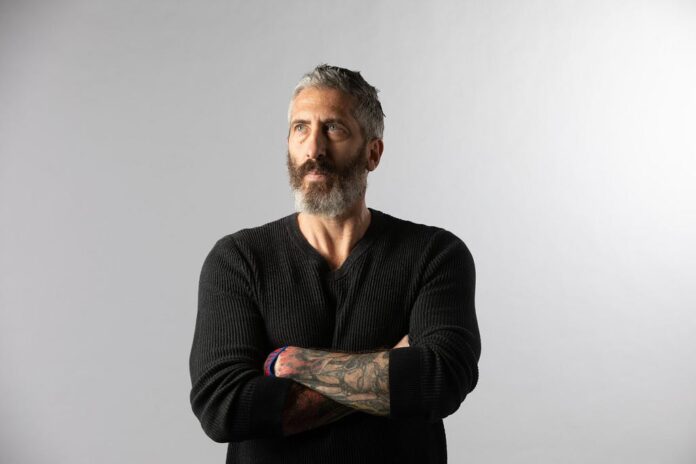Quiet Committing: Michael Sonbert Of Rebel Culture and Skyrocket Education On The Five Commitments High Impact Leaders Make & Keep To Themselves Daily
An interview with Karen Mangia
1 . Remember the sacred responsibility I have as a leader.
2 . Ensure my team members’ work is meaningful.
3 . Don’t take things personally.
4 . Uphold our values.
5 . Express gratitude to the team.
Quiet quitting is the emerging phenomenon of employee disengagement, essentially quitting on the job. What strategies do high-impact leaders deploy to motivate themselves and those around them to move from quiet quitting to quiet committing? Because, at its core, there is no change without commitment. Commitment to change ideas. Change beliefs. Change perspectives. Change routines, rituals and boundaries. Organizations change one commitment at a time. One leader at a time. As part of our series about “Quiet Committing: The Top Five Commitments High Impact Leaders Make & Keep To Themselves Daily”, we had the pleasure of interviewing Michael Sonbert.
Michael Sonbert is an author, speaker, performance coach, educator, endurance athlete, autism dad, and the founder and CEO of Skyrocket Education and Rebel Culture. He’s turned his passion for educational reform into a global call to action for educational and corporate leadership transformation. Michael has dedicated the past 20 years to coaching, partnering with, and researching leaders from public schools to Fortune 500 companies. He’s committed to helping business leaders grow thriving, impactful, purposeful organizations. His leadership philosophies are currently being taught in a graduate course at the University of Notre Dame’s leadership program. Partners include Google, Northwell Health Systems, and Paul Mitchell Schools. Currently living in New York with his wife and three children, he sits on the board of the Autism non-profit organization, Families for Inclusion
Thank you for making time for our visit. What was the first job you had, and how did that job shape the leader you are today?
My first job was washing dishes and delivering pizzas at a local pizza place in my town. My boss was an erratic lunatic. He used to throw garlic knots at customers if they complained about anything. He screamed at us often. We were all terrified of him. I decided to be the opposite of that for my teams.
We’re talking about quiet quitting in this series. What’s the greatest lesson you’ve learned from a job you decided to quit?
That everyone is replaceable. We think we aren’t, but in a few weeks, it’s like we were never there. This shouldn’t be a disheartening message, though. Instead, it should be a wake-up call to people who are killing themselves for ungrateful or incompetent bosses. They’ll replace you in a second if they need to. Give them feedback. Manage up. But if it’s not going to work, get out of there.
Employee Engagement is top of mind for most organizations. How do you define an engaged employee?
We manage our teams closely, and our work is incredibly hard. Any employees on our teams are by default, highly engaged. If they weren’t, they’d never be able to do the work we ask them to do.
Say more about your Employee Engagement portfolio. What’s working? What’s not working? And what are you piloting now to address the Quiet Quitting trend?
We provide ongoing feedback to our teams. We have twice-yearly evaluations. We reference our values at team meetings and retreats and ask everyone to reflect on where they’re meeting them and where they could do better.
What’s not working, and I see this often with teams I coach, is leaders leaving their team members alone to figure out their jobs. Having smart people is great. But that’s not an excuse to leave them alone and untethered. That approach breeds disengagement. Team members should be met with often, provided with ongoing feedback, and held highly accountable for producing A+ work.
As goes the leadership, so goes the team. How do you hold leaders accountable for their own level of engagement?
It’s similar. Connection to values, clear descriptions of the work they need to do, and painting for them what success looks like. Observations, feedback, and a close connection to the work they do ensures they’re engaged and that I am as well.
The first phase of the pandemic ushered in the phenomenon called The Great Resignation, where employees left organizations to pursue greater meaning and purpose. Then came The Great Reshuffle, where employees left organizations to pursue promotions, pay and perks. Now we’ve entered a third phase, Quiet Quitting, where employees are deeply disengaged. What do you believe to be the key drivers of Quiet Quitting?
First, ineffective leadership is at the heart of all these phases. I say, often, that the pandemic didn’t create any of these workplace trends. It revealed them. As long as leaders take a hands-off approach to leadership, they’re leaving themselves open to Quiet Quitting. But again, this isn’t a new phenomenon. We’ve just named it.
We’ve all had bosses we deemed idiotic or useless. I didn’t work as hard for them as I did for rock star bosses who were clear on their vision and who pushed me to be great. We’ll hit a new phase soon. Great leaders will feel the pinch much less than those who think leadership is a title and not an action.
What do you predict will be the next phase in the evolution of the employer / employee landscape?
People want to feel like what they’re doing everyday matters. For leaders who can shape their environments so their teams feel this, I do think the pendulum will swing back in some sense, and we’ll see a landscape that looks as close to pre-pandemic than we have in a while. With one caveat: I believe leaders will need to chop unnecessary red tape and protocols and broken systems to keep their teams happy and engaged. Meaning, employees won’t tolerate three meetings to discuss the same thing anymore. This is a good thing.
For leaders who think they’re the most important person on their teams, instead of the least, they’ll continue to lose people.

Change requires commitment and happens one choice at a time. What are the top five commitments you make and keep to yourself daily that have a material impact on those you lead?
1 . Remember the sacred responsibility I have as a leader.
2 . Ensure my team members’ work is meaningful.
3 . Don’t take things personally.
4 . Uphold our values.
5 . Express gratitude to the team.
What’s the most effective strategy you’ve discovered to get back on track when you break a commitment you’ve made?
Own it. Every last piece of it. To myself or to whomever I broke the commitment to. No excuses. Then recommitment.
Thank you for sharing these important insights. How can our readers further follow your work?
Thanks for having me. They can check out my Michael Sonbert Linkedin and Michael Sonbert IG or email me at Michael@RebelCulture.com
My websites are www.RebelCulture.com and www.SkyrocketEd.org
We wish you continued success and good health!
Thanks! I wish the same for you, Karen!
About The Interviewer: Karen Mangia is one of the most sought-after keynote speakers in the world, sharing her thought leadership with over 10,000 organizations during the course of her career. As Vice President of Customer and Market Insights at Salesforce, she helps individuals and organizations define, design and deliver the future. Discover her proven strategies to access your own success in her fourth book Success from Anywhere and by connecting with her on LinkedIn and Twitter.
Quiet Committing: Michael Sonbert Of Rebel Culture and Skyrocket Education On The Five Commitments… was originally published in Authority Magazine on Medium, where people are continuing the conversation by highlighting and responding to this story.


